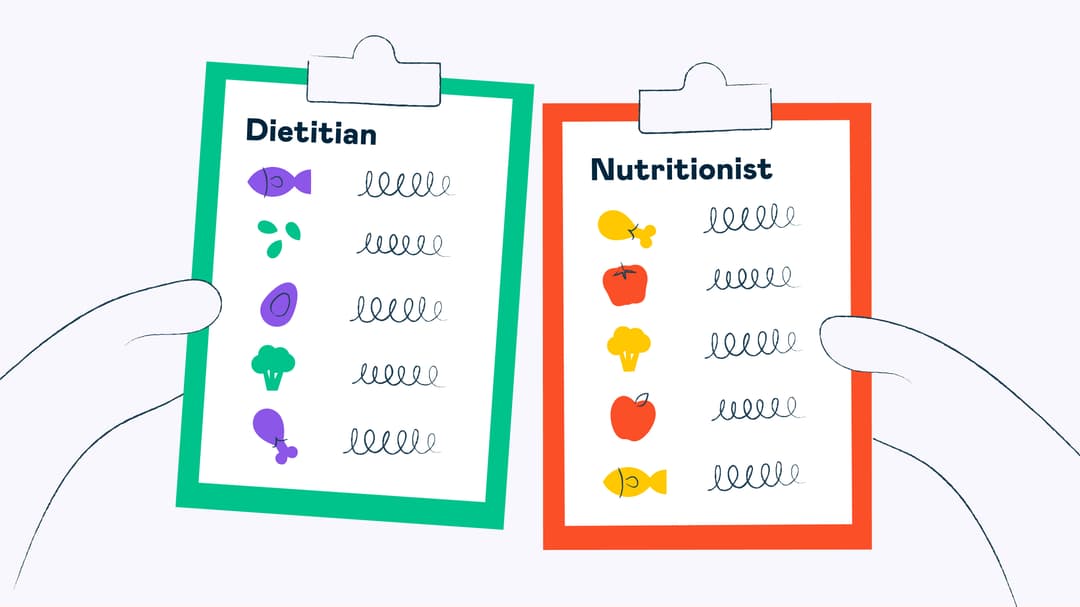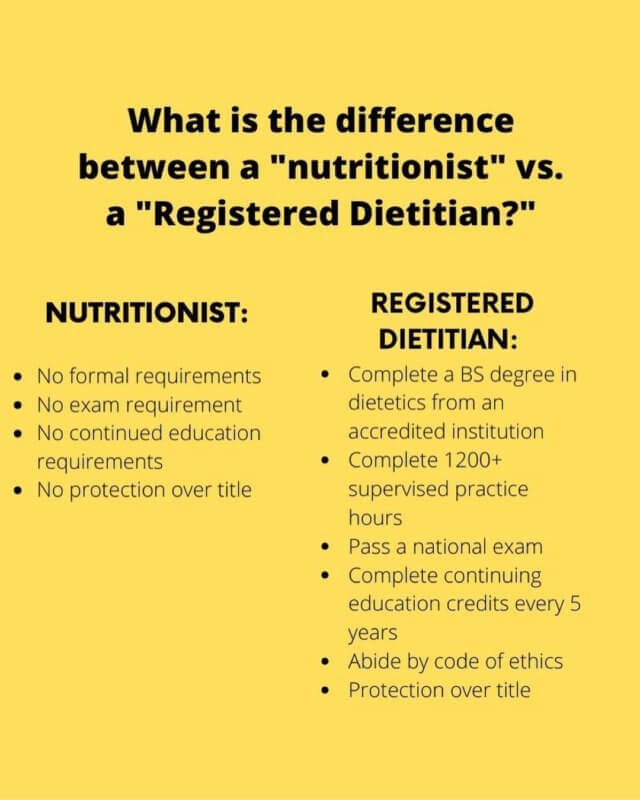All Categories
Featured
Table of Contents
-1
In the United States and lots of other nations, a dietitian is a board-certified food and nutrition professional. They are very informed in the area of nutrition and dietetics the scientific research of food, nutrition, and their effect on human wellness. With substantial training, dietitians get the proficiency to provide evidence-based clinical nourishment therapy and nutritional counseling customized to satisfy a person's requirements.
-1To make clear, the credentials of RD and RDN are compatible. However, RDN is an extra recent designation. Dietitians can choose which credential they would certainly rather make use of. To gain these credentials dietitians-to-be must initially earn a bachelor's degree or equal debts from an accredited program at a college or university. Typically, this needs an undergraduate science level, consisting of training courses in biology, microbiology, organic and inorganic chemistry, biochemistry, anatomy, and physiology, in addition to even more customized nutrition coursework.
Nutritionist Specialising In Diabetes – Swan View
-1This enables them to evaluate severe requirements, prioritizing lethal conditions. Inpatient and outpatient dietitians also provide nutrition education and learning to people with specialized needs, such as those freshly out of surgical treatment, in cancer cells therapy, or detected with persistent health problems like diabetes or kidney illness. In the outpatient setup, they provide extra extensive nutritional therapy functioning towards a nutrition-oriented goal.
-1Research study dietitians generally function in study healthcare facilities, companies, or colleges. As soon as dietitians have gained their qualifications and are functioning in the area, they can go on to specialize in a particular subcategory, such as pediatrics or sports dietetics.
-1Others may work as wellness and nutrition specialists in media or as public audio speakers (Certified Pediatric Dietitian). Dietitians are certified to take care of nutrition therapy across a period of severe and persistent conditions.
Sports Dietitian
-1In numerous states, such as Alaska, Florida, Illinois, Maryland, Massachusetts, and Pennsylvania, RDs and CNSs are granted the exact same state certificate, normally called a Qualified Dietitian Nutritionist (LDN) certificate. In states that do not manage the usage of this term, any individual with an interest in diet plan or nourishment may call themselves a nutritionist.
-1Nonetheless, because uncredentialed nutritional experts commonly do not have the knowledge and training for clinical nourishment treatment and nutrition therapy, following their suggestions could be considered harmful (). Prior to getting in touch with a nutritional expert, you might desire to inspect whether your state controls who may use this title. In the U.S. states that don't manage the term, no degrees or qualifications are required to be a nutritionist.

-1
In states that do mandate licensure, the CNS or RD credential may required. Those with CNS credentials are health and wellness experts like registered nurses or medical professionals with innovative health and wellness levels that have looked for out extra coursework, completed supervised practice hours, and passed a test supervised by the Board for Accreditation of Nourishment Specialists.
-1While a few of these methods may have robust scientific support, others may not. Giving nutrition suggestions without the proper understanding and training can be harmful, particularly when counseling those with health conditions. If you are thinking about speaking with a nutritionist, you might want to ask if they are a CNS or have state licensure or accreditation, or another credential.
Holistic Nutritionist
-1Several states specifically regulate this term. Furthermore, nutritionists may seek an advanced CNS accreditation.
-1It can be challenging to aid individuals make real, long-term changes in their lives. Nonetheless, when you obtain an effective case, the payoff can be exceptionally gratifying. If it's a career choice that you wish to go after, there are 2 main career choices available to you. Both dietitians and nutritionists provide a series of nutrition-based services to clients.
-1They should have finished some level of education in their area. They are additionally called for to have actually completed as much as a year of supervised work, working within an assisted program at a medical care center, providing business, or neighborhood body. Dietitians have much better expectations put on their capacities and level of expertise.
-1This suggests that there is no body that manages their credentials and no especially rigorous standards that nutritionists need to follow in order to be able to practice. Dietitians, on the other hand, are registered with nationally identified bodies, such as the Dietitians Organization of Australia. They need to comply with the National Competency Requirements for Dietitians.
Clinical Nutritionist – Swan View 6056

-1
However, you can exercise as a nutritionist without the very same level of certification as a dietitian. Nutritionist training courses can differ in length and high quality, with some as brief as 6 weeks and covering far less content than a dietetics course. Relying on your education and learning company, you can gain a significant quantity of expertise with researching an easy nourishment training course; nevertheless it is very important to examine the program material prior to beginning.
-1This can consist of going to market workshops or reviewing industry publications. Nutritional experts, on the other hand, normally gain their qualifications in order to supplement other qualifications and supply better guidance to their clients. Nutritionists can gain work in a broad variety of fields, including public wellness advice, suggestions for individuals, and collaborating with exclusive organisations.
-1Nutritional experts can work with sporting organisations, fitness centers, institutions and suggest media outlets on fundamental terms and appropriate use of terms. Dietitians can work in most of the exact same roles as nutritional experts.
Personal Trainer And Dietitian – Swan View
-1Dietitians commonly function with more medically sensitive clients. Since of the high level of knowledge needed to give services to these individuals, just certified dietitians are allowed to provide treatment.
-1In Australia there is a difference in between a dietitian and various other nutritional wellness providers consisting of nutritionists. All dietitians are nutritionists, yet nutritional experts without a dietetics credentials can't call themselves a dietitian.
-1Dietitians with the Accredited Practising Dietitian (APD) credential devote to ongoing training and education and learning throughout their professions. As a profession, nutritionists are not regulated in Australia under NASRHP or certified under a single regulatory body.
Pregnancy Nutritionist
-1If you have a persistent health condition and a treatment strategy from your General practitioner, you might be able to declare a Medicare rebate when you see an APD. The main function of individuals working in the occupation of dietetics is embodied in this declaration: The profession of dietetics adds to the promo of health and wellness and the avoidance and treatment of ailment by optimising the nutrition of populaces, communities and individuals. Sports Dietitian.
Latest Posts
Health & Wellbeing - Perth ( Joondalup 6020)
Ndis - Perth – Carey Park
Weight Concerns - Perth